|

Need for a Children's Magistrate's
Court raised
The need for a "Children's Magistrate's Court" to be established in
the Judicial Zone of Colombo has been raised, following the high
percentage of children's cases reported in the Juvenile Courts,
Bambalapitiya and Colombo ..
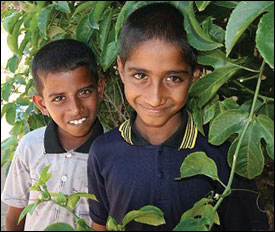
Ministry of Justice and Law Reforms Secretary Suhada Gamlath made
this observation at a conference held recently in Colombo, attended by
Ministry Additional Secretary (Legal) Ms. Kamalini de Silva, Judges
Training Institute Director, Justice N. Udalagama and Deputy Solicitor
General Jayantha Jayasuriya, representatives from the National Child
Protection Authority, Human Rights Commission, Departments of Police,
Labour, Probation and Child Care Services, Save the Children in Sri
Lanka, UNICEF, Consortium of Humanitarian Agencies and Institute of
Human Rights.
The research findings and observations based on data collected from
the Magistrate's Courts in the Judicial Zone of Colombo were formally
presented to child protection stakeholders at a meeting held at the
Ministry of Justice and Law Reforms recently.
The data collection was carried out by the Ministry in collaboration
with the Judicial Service Commission and Save the Children in Sri Lanka
(SCISL), with financial assistance from USAID. The research was
conducted by Attorney-at-Law/Consultant to SCISL Harshana
Nanayakkara.Among the key findings was that a vast majority of children
who came into contact with the justice system were those "in need of
care and protection" (as defined by the Children and Young Persons
Ordinance), in comparison to child offenders.
Also highlighted by the research was the need to strengthen the
co-ordination between the Police and Probation Services in order to
avoid unnecessary delays and related consequences for children in
contact with the law. It was further revealed that a significantly high
percentage of children's cases was reported.
The proposed Children's Magistrate's Court is to be financed by the
USAID.
|
Birth and death
anniversaries from
September 27 - October 3 |
Compiled by W.A. Rusiru JAYASURIYA
September 27
Rev. Dr. Peter Pillai (founder of Aquinas College) passed away in
1964.
Olivia Newton John, pop singer was born in 1948.
September 28
Dr. G. P. Wickramaarachchi, ayurvedic physician was born in 1889.
Louis Pasteur, French chemist and bacteriologist who discovered the
vaccine for rabies, died in 1895.
Lata Mangeshkar, Indian singer was born in 1929.
Albert Ascoll, an Italian who discovered the anti-tuberculosis
vaccine died in 1957.
Pope John Paul I, passed away in 1978.
September 29
Charles Henry de Zoysa died in 1890.
Lech Walesa, a former President of Poland was born in 1943.
Prof. Senaka Bibile, a former Chairman of the State Pharmaceuticals
Corporation, died in 1977.
Karu Jayasuriya, Member of Parliament was born in 1940.
September 30
Rudolph Diesel, German automobile engineer died in 1913.
Sri Lal Hikkaduwa Liyanage, the founder editor of Mihira, Tharunee
and Navayugaya weekly papers died in 1998.
October 1
Julie Andrews, English actress and singer (of Sound of Music fame)
was born in 1935.
Sivaji Ganesan, Indian film actor was born in 1928.
William Edward Boeing, founder of Boeing Aircraft Company was born in
1881.
October 2
Ven. Narada Maha Thera of Vajiraramaya passed away in 1983.
Mahatma Gandhi, Pioneer of the Indian Freedom Movement was born in
1869.
Lal Bahadur Shastri, a former Prime Minister of India was born in
1904.
Sir John Kotelawala, a former Prime Minister of Ceylon died in 1980.
Rev. Robert Runcie, a former Archbishop of Canterbury was born in
1921.
October 3
Sridath Ramphal, a former Secretary General of the Commonwealth was
born in 1928.
Pieter Keuneman, former leader of the Communist Party was born in
1917.
Elias Howey, an American inventer of the sewing machine died in 1867.
|
Special events
which took place
in history from September 27 - October 3 |
September 27
World Tourism Day.
Surveyor's Institute of Sri Lanka was established in 1926.
Ceramic factory at Negombo inaugurated in 1955.
New Constitution of the Democratic Socialist Republic of Sri Lanka
came into operation in 1978.
September 29
National Savings Bank was established in 1931.
September 30
World Heart Day.
Botzwana became independent in 1966.
October 1
Independence Day of Nigeria
Independence Day of Cyprus
World Children's Day.
International Day of Older Persons
District Courts were setup in Ceylon in 1803.
Atomic Energy Authority was established.
October 2
Guinea gains independence from France in 1958.
October 3
World Temperance Day.
West Germany was re-united with East Germany in 1990.
Korean Independence Day.
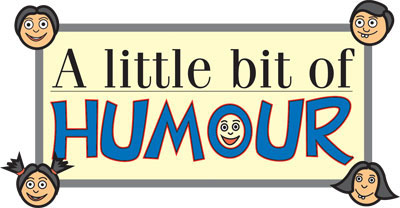
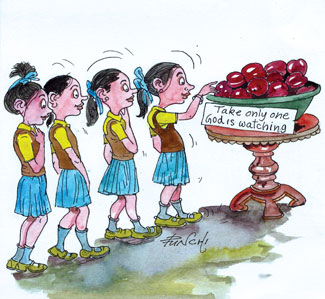 The
children were lined up in the cafeteria of a Catholic elementary school
for lunch.At the head of the table was a large pile of apples. The nun
made a note, and posted on the apple tray: "Take only ONE. God is
watching." The
children were lined up in the cafeteria of a Catholic elementary school
for lunch.At the head of the table was a large pile of apples. The nun
made a note, and posted on the apple tray: "Take only ONE. God is
watching."
Moving further along the lunch line, at the other end of the table
was a large pile of chocolate chip cookies. A child had written a note:
"Take all you want. God is watching the apples."
National
Children's Council to be set up
by Ananda KANNANGARA
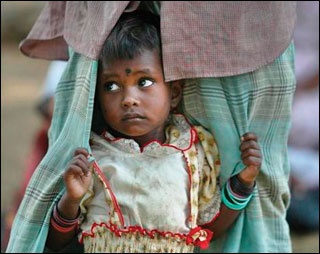
Sri Lanka's first 'National Children's Council' (NCC) comprising 100
schoolchildren from all parts of the country will be established by the
Probation and Child Care Services Department to mark World Children's
Day which is celebrated in our country on October 1. The child
representatives will be selected from all districts of the country,
including the Northern and Eastern districts.
The objective of establishing such a council is to encourage Sri
Lankan children to voice their ideas and suggestions to policy makers at
national level.Speaking to the Junior Observer, Probation and Child Care
Services Commissioner, Sarath Abeygunawardana said elders must give a
patient hearing to the voice of children, since they too have the right
to convey their views, ideas and proposals.
"In our country, many adults are in the habit of taking their own
decisions when discussing about matters related to children,
He said important decisions must not be taken by elders without
discussing them with children.
"It is the paramount duty of elders to give such an opportunity to
children, considering the fact that these children would one day become
the decision-makers,"
The NCC will also ensure the protection of the rights of children,
development of their skills and also their moral development.
He said countries such as Nepal and Bangladesh have already commenced
numerous national level programmes for the benefit and protection of
children in their respective countries, and Sri Lanka too must ensure
that the children are given the best protection and benefits.
|
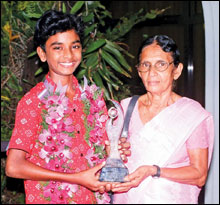
Kokila with his grandmother at the Bandaranaike International
Airport. |
Child actor
wins award
Child actor Kokila Jayasuriya who played the main role in Somaratna
Dissanayaka's film Siri Raja Siri won the Best Child Actor award at the
10th International Children's Film Festival which concluded in Qingdao,
in Phoenix Island in China on September 13. This is the sixth
international award won by the film Siri Raja Siri which was represented
at the festival in China by Producer Renuka Balasuriya and the actor
Kokila. Siri Raja Siri was among the 12 films which vied at the final
round of the festival which altogether featured 250 films. The 12 films
at the finals were from USA, France, Italy, UK, Japan, India,
Switzerland, Brazil, Germany, China, Russia and Sri Lanka.
First Sinhala
children's newspaper relaunched
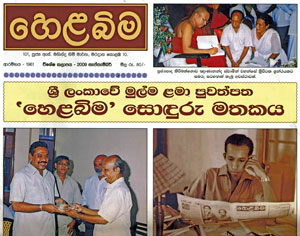
The first Sinhala Children's newspaper published way back in 1961 was
relaunched at the International Book Exhibition held at the BMICH,
Colombo 7, on September 16.
The children's newspaper entitled 'Helabima' was edited by Dayawansa
Jayakody. The special issue printed for the exhibition has reproduced
some of the contributions made by Prof. Ediriweera Sarachchandra, K.
Jayatilaka, Athula Manchanayake, Nimal Siripala, Sunil Ariyaratne,
Sunanda Mahendra, Siri Kahawala, Karunaratne D. Phillip, Newton
Gunasekara, Sisira Senaratne and R. Premadasa.Most of these writers were
in their youth and they rose to eminent positions in later life. Even
the editor of the newspaper - Dayawansa Jayakody - was a student at
Ananda College, Colombo.
'Helabima' carried interesting short stories, poems, pocket cartoons,
news and views relating to children and their education.
A national census in 2011
After a lapse of 30 years, the Department of Census and Statistics
will conduct the 14th National Census of Population and Housing in 2011,
covering all 25 districts. This was revealed by the Director H.R.
Gunasekera at a press conference in Colombo, recently.
A large number of numerators - 85,000 - would be taking part in this
census which will be conducted from house to house all over the country.
About 30 million questionnaires will have to be filled from the
households, by the enumerators.
The last national census was held islandwide in 1981 and a census
held in 2001 was able to take in only one district out of the eight in
the North and East, Ampara; terrorist activity in the other seven
districts prevented the census being conducted.Preliminary preparations
for the census such as Grama Niladhari division maps and census block
maps in 18 districts are in progress and the same process will commence
shortly, in eight Districts of the North and East Gunasekera said.
The first national census was done in 1871 under the Census Ordinance
of 1871 during the British Colonial Government.
The census is the only source of social, economic and demographic
information on each and every individual and on living quarters at a
given point of time, and is the basis for national and subnational
development plans and policies.
The public should be aware of its importance.The current legal
enactment covering the populations or housing census gives authority to
enumerators - agents of the Director Census and Statistics to ensure the
confidentiality of the information given by householders and members of
the public in answering the questionnaires used in the census, the
Director said. |

